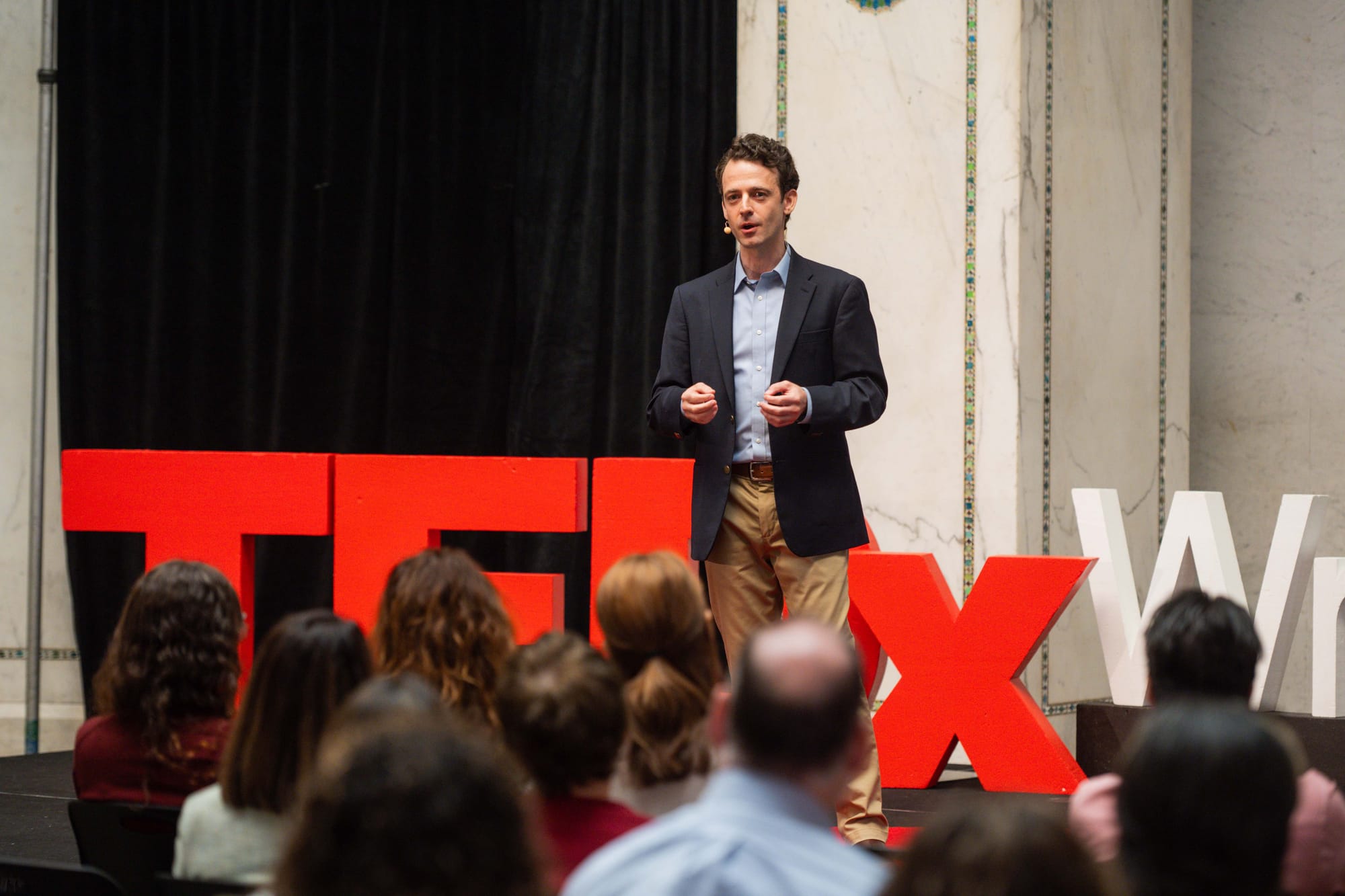My First Tedx Talk! Reflections on a unique experience.

So, I gave a TEDx Talk!
It's not something I ever thought I would do, nor something I ever tried to get myself into. Luckily, the organizers of TEDxWrigleyville in Chicago, the extraordinary Shermin Kruse and Ghazal Banisadr, worked hard to convince me to accept their invitation this year, and I finally relented.
Little did I realize how intense the process was going to be!
I have to say that the TEDx team was phenomenal, and gave me all the support I needed to succeed. They put positive pressure on me months ahead of time to propose several ideas, then to write the first draft of my speech, which I had to submit to them for approval. From then on, we met regularly over zoom to discuss the talk and fine tune it. And finally, I had to practice giving the speech a few times prior to the big day.
To be clear, nothing about this was improvised. I had to write a proper speech, memorize it word for word, and then master its delivery. There would be no note carrying on stage, no teleprompter to read at a distance. Every word had to be seared into my memory.
While I have given many speeches, lectures and various public talks in my life, as well as been on radio and television, I have never had to memorize a speech the way one memorizes a poem for school. It was a test on my mental capacity to retain every word, every sentence in order.
But first, the writing process...
As a history and English double major at Georgetown University back in my student days, I got good at writing research papers of all kinds. I even studied journalism for a bit, and did my fair share of theater studies. Writing is something I love doing.
This TEDx experience required a number of things which were important:
- A driving idea (TED is all about “ideas worth sharing”)
- At least 3-5 stories to illustrate the larger idea
- A well-researched argument having to do with music (my specialty) and some aspect of democracy (as this event was co-sponsored by TED Democracy)
- Concise storytelling, for a total speech time of less than 14 minutes (the shorter the better)
- Audience engagement in some form (optional)
I knew I wanted to bring in Beethoven's Ode to Joy as an example of a work of music that has inspired people around the world in many different situations; and then I began looking for other music stories that had an impact on social and political history.
I remembered the story of the Christmas Truce of World War I, where opposing armies laid down their arms for 24 hours to celebrate the holiday together, in part made possible by song (along with cigarettes and alcohol...). I also wanted to address the importance of music in the Civil Rights movements of America, and of various key works of music, and musicians, that have shaped the world. This included Marian Anderson, Josephine Baker, John Lennon, Leonard Bernstein, Aretha Franklin, Daniel Barenboim, Public Enemy, and also Taylor Swift.
So I put it all together, and worked particularly hard at creating a sense of drama and suspense within the layout of the speech. Since coming out on YouTube a few days ago, I have received numerous compliments on my strong opening, which is key in getting people hooked. I am happy that this has encouraged people to watch to the end.
It is very much the same with performing music (something I do all the time). Indeed, knowing how to create a sense of drama and suspense from the beginning of a performance is part of what is needed to get the full mental and emotional attention of one's audience, necessary to engage them with the musical thread and message.
The truth is, we all need something to hang on to. The way stories are told, whether with words or with musical notes, affects our understanding of the stories themselves. You can have the same story be told one hundred different ways, yet feel a very different emotion depending on how the story is laid out. Much of it depends indeed on the quality and style of delivery.
Homer may not have invented the stories of the Iliad and the Odyssey, but he certainly made a name for himself with his ability to deliver them in the most dramatic and memorable ways. These kinds of well-told stories then shape our collective unconscious, help build our common cultural reference points and even our civilizational value systems.
And so, knowing that this TEDx Talk would be put online "forever", the pressure was on!
I must have written at least 5 major drafts and reworks for my speech, each one shorter than the previous, and more precise. The first draft gave me a reading time of 21 minutes! Way over time. But there was so much great content there. The hardest thing for me was to spruce the talk and cut a lot of it out. I certainly have plenty left for a second speech along the same idea, although what I may do is simply share these other stories in writing via this platform.
Learning to edit, cut and recut, is one of the hardest, but most important skills in writing (as well as in music composition). Everything that is left must be justified by the mission and the flow. It's no easy task.
Choosing the best turns of phrase, thinking not only about how many stories are included, but how many words, is part of that trimming process. One quickly learns that there are many different ways to go about expressing a thought. And the pithiest is often the most memorable, most impactful for an audience.
While I memorized my talk a good two weeks before my speech, I kept making improvements in it (changing the order of words and even paragraphs around). I was still making changes the night before the talk, which required that I retrain my brain to remember the latest edits, and not revert to what it had become accustomed to in the previous iteration. That was an added challenge.
Lastly, I practiced pronouncing my speech, mostly to the flowers and the trees I was using as my test audience over the Summer. This practice included exaggerating the movements of my mouth and tongue, in order to train the muscle memory needed for a smooth, nearly automatic delivery.
By over-articulating my words, by consciously selecting the words I wanted to emphasize in each phrase (I do this in musical phrases as well), I practiced the physicality and the musicality of the speech, something many people don't consider when they think of public speaking.
I also practice-performed the speech in front of my mother and partner. That was a tough but very useful practice (it is often much harder to perform for people who are close to you than for strangers).
To further prepare and get inspired, I studied many great speeches: Pericles' Funeral Oration from the History of the Peloponnesian War as recounted by Thucydides, Abraham Lincoln's Gettysburg Address, Theodore Roosevelt's Man in the Arena, John F. Kennedy's Presidential Inaugural Address, Martin Luther King Jr. I Have a Dream, Maya Angelou's Pulse of Morning, and many others. It helped me gauge the kind of delivery I wanted to adopt, and how I wanted to build up the energy of my writing and speaking.
When the big day came, I had a chance to spend a few minutes on stage practicing my steps on the famous "red dot carpet" that every TED speaker is supposed to stay on. It's very small indeed, and allows one to take only a handful of steps in one or the other direction.
As I learned in my theater classes at university, an actor has to learn to use all the available space, both horizontally and vertically! So I took a few moments to appropriate this red carpet to get familiar with the kind of pacing I could do and how much I could inhabit it with my body.
Of course, I practiced using my arms and hands to emphasize a few key moments in the talk, including the closing moment when I got everyone to sing along. Arms and hands are often forgotten elements of speaking, but they have their role to play: too much movement and they become a distraction; too little and they become useless limbs. It's all about using everything we have to embody our message.
The lesson of this experience? Preparation is key! And there are many facets to good preparation indeed which I had not fully considered when accepting the offer to speak. These lessons will continue to serve me in all areas of life, and I am so grateful to have had this chance. I will happily do it again, and next time, I will be even more efficient in my preparation, knowing not only what it entails, but how to train my brain to be extremely precise from the very start of the process in selecting its topic and building the framework to carry my idea into the world.
Have you seen my speech? Please let me know what you thought, and share it with your friends if you liked it (algorithms love sharing, liking and commenting, and it helps them spread the video to even more people)!
I'll be happy to answer any questions you might have about the speech and the process of preparation.
Thanks for reading.
P.S.: I am so happy you are here following my work. If you are on a free account, please consider subscribing at one of the paid levels. It goes a long way for me in my work to write as well as in my work as a musician, preparing for my recordings and managing the many expenses of my career. You can also follow me on your favorite streaming services, and on my YouTube channel, which is also very helpful. Thank you!
